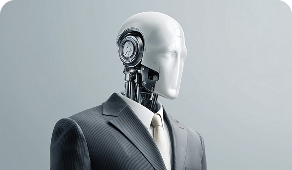Essential Skills to Build AI Business Solutions
“What types of people do I need to hire to build AI business solutions for our company?” I've been asked this question repeatedly over the past few years. And, not surprisingly, my answer has changed over that time. The skills required to develop and implement a commercial AI solution are very different today than they were a few years ago, and they will continue to evolve.
Key Points
-
The skills needed for building AI business solutions have broadened, and deep math expertise is no longer required for many use cases.
-
Key roles include AI engineers, solution architects, data experts, visualization/UX designers, and change management professionals.
-
AI in business analytics shows that upskilling internal staff is often more cost-effective than competing for scarce external talent.
-
“Edge” cases still require advanced expertise, but most companies can start small and scale with the right team structure.
How Have Skill Requirements for AI Business Solutions Changed?
Until recently, most engineers working in Artificial Intelligence had deep academic backgrounds and years of experience, often honed in a research setting. Their work required an advanced understanding of mathematics (including probability, linear algebra, and calculus) and computer science, and they were employed creating highly custom AI models to solve specific problems.
With this specialized background, the number of such experts in the job market was low, and competition for these people was fierce. Consequently, building a team of AI experts was an expensive undertaking, and retaining them was challenging. This put AI business solutions out of the range of many companies.
Over time, however, the need for deep mathematical expertise has declined in many business applications. AI frameworks like TensorFlow and PyTorch have allowed engineers to focus on applying models rather than inventing them. Open-source AI models further accelerated this shift.
Today, AI workbenches allow even technically proficient business analysts to experiment with AI in business analytics, democratizing access to these tools. With the release of Large Language Models (LLMs) like ChatGPT, Llama, and Gemini, AI is more accessible than ever.
Still, there are limits. Fine-tuning an LLM or using retrieval-augmented generation (RAG) requires more technical skills. And for “edge” use cases, advanced expertise remains critical.
What Can We Learn From Software Development?

We can look to the field of software application development to see how the skills needed for AI solution development might evolve. When I joined the field a few decades ago, there were many people like myself who had Computer Science degrees. There were coders who had other backgrounds, but many of the biggest software engineering tasks were handled by those with formal training in Computer Science.
Today, by contrast, commercial Stack Overflow Developer Survey 2022 application development does not require a Computer Science degree. A study by Microsoft in 2012 found that 60% of working software developers did not have a CS degree, and more recently, the Stack Overflow 2022 Developer Survey showed that, while over 70% of professional software developers who responded had at least a Bachelor's Degree, these degrees included many non-CS scientific fields as well as Bachelor of Arts degrees.
Similarly, AI is on a path where mainstream AI business solutions can be built by skilled engineers, architects, and analysts, without requiring PhD-level specialists, while “edge” cases still demand deep expertise.
What Skills Are Needed to Build AI Business Solutions?
There’s no single answer, but here are the main roles companies need:
AI Engineers
The most obvious role in AI solution development is that of the AI Engineer, or AI developer. The level of scientific and mathematical background required for this role (in a typical commercial setting) is coming down. But it is still a specialized role that requires specific knowledge. Today, an AI Engineer needs to understand the concepts behind the AI tools they'll be using, with some proficiency in machine learning, deep learning, and neural networks. They also need to be familiar with the tools and frameworks you'll use for building models, such as TensorFlow, PyTorch, and Kubernetes. This should be complemented by an understanding of data, how to work with it, and its limitations.
Solution Architects
The ability to bridge business and technology has always been important, and it will continue to be so. People who can work at the intersection of technology and business go by many names, such as a business analyst, a solution architect, a business architect. Sometimes they don't have a title that reflects this role. But regardless of title, they share the ability to understand business challenges and opportunities, and then work with technologists to design and implement a solution. This role will be as essential for AI as it is for traditional application development.
Data Experts
Another critical skillset for developing AI solutions is to understand the data that is used to train and provide input to AI models. It's no secret that most companies have spent far more time and attention on developing the functionality of applications than they have on the data capture and data management aspects of those applications. So, at least for the foreseeable future, there will be significant work required to acquire and make usable the data that AI models need. Data experts who understand data engineering, data architecture, semantics, and data quality will play an essential role in creating AI solutions.
Visualization and User Experience
We also should remember that most AI models, outside the realm of generative AI at least, create outputs that are not immediately digestible by business users.
For example, a prediction model may express its output as a numerical value with a range between 0.0 and 1.0. In most cases, that would not be immediately meaningful to the intended user. We will need experts in visualizing data and translating numerical outputs of models into a meaningful user experience. These team members will understand how this signal that comes out of an AI model will be used, and can transform that into the appropriate output for a business user.
This output could be a metric indicator, a number, or a graph or metric in a visualized data environment. The output could also be an SMS alert, an email notification, or a voice notification. Integrating the output of AI into the business process will continue to be an essential skill.
Business Process Experts
We will also need experts in business process redesign or business process engineering, who understand how a business process can be optimized to take advantage of the capabilities of AI. We've learned many years ago that it's not always the best approach to simply automate an existing process through technology. Sometimes we need to redesign or optimize that process to take advantage of the way technology can support it.
Training and Change Management
As long as technology in general, and AI in particular, continues to evolve at a rapid pace, we will always have a need for people skilled at helping organizations adapt to change and acquire the new skills and competencies that they need. For sophisticated tools like AI, training, education, change management and related skills will be essential, especially as the pace of innovation continues to run quickly.
Other Areas of Expertise
These are certainly not all the skills necessary to support the implementation of AI solutions, but it should give a sense of the variety of skills and backgrounds that are necessary to create an effective and sustainable use of artificial intelligence. There are many other crucial roles that need to participate in AI system development, including cybersecurity, data privacy, technology infrastructure, and more.
Roles Required for AI Business Solutions
| Role | Core Function | Example Tools / Skills |
|---|---|---|
| AI Engineer | Model building, tuning | TensorFlow, PyTorch, ML techniques |
| Solution Architect | Align AI with business | BPM, systems architecture |
| Data Expert | Data pipelines & quality | ETL tools, SQL |
| Visualization / UX | Translate model output | BI tools, dashboards, UX design |
| Process Expert | Optimize workflows | Business process management |
| Change Manager | Drive adoption | Training, communication, leadership |
How Do You Balance Hiring vs Upskilling?
Many firms rush to hire elite data scientists. Yet these experts cannot succeed without infrastructure, data, visualization, and change support. Competing in the open market for scarce AI talent can also be prohibitively expensive.
A better strategy is often to upskill internal employees who already understand the business. Upskilling, supported by selective use of external consultants, builds long-term capability.
As McKinsey’s AI adoption research shows, organizations that invest in multidisciplinary AI teams and internal training scale adoption faster than those who over-rely on external hires.
Can Non-Technical Professionals Contribute to AI in Business Analytics?
Yes. Non-technical staff can use low-code AI tools and LLMs for many practical use cases. While “edge” cases still require deep specialists, most AI in business analytics tasks (forecasting, classification, optimization) can be handled by analysts with training in AI-enabled platforms.
The Human Side of AI Business Solutions
This video provides a helpful overview of how AI can support business growth, while reinforcing that human decision-making and business process integration remain central.
How Do You Avoid Common Pitfalls?
Challenges in building AI business solutions include:
-
Poor or fragmented data
-
Misaligned use cases
-
Underestimating change management needs
-
Overreliance on technical hires without business support
-
Ignoring governance and compliance risks
Proactively addressing these risks through clear strategy and multidisciplinary teams improves success.
Building AI Business Solutions: A Practical Roadmap
-
Define clear business use cases tied to value
-
Assess existing data and technology readiness
-
Build a multidisciplinary team (engineers, architects, analysts)
-
Upskill internal staff with targeted training
-
Use external consultants strategically, to accelerate but not replace internal growth
-
Monitor performance, adoption, and ROI
For more on how AI strategy intersects with leadership, see our blog When Your Board Asks About Your AI Strategy.

Ready to Build AI Business Solutions That Work?
AI is no longer a future concept. It is a present-day business requirement. Companies that wait risk falling behind competitors who are already integrating AI business solutions into operations, analytics, and decision-making.
Now is the time to invest in people, processes, and strategy. Contact us to explore how we can help your team build and scale AI capabilities.
FAQ on AI Business Solutions
Q: What is an AI business solution?
A: It’s an application of AI technology, from predictive models to generative AI, designed to solve business problems, optimize processes, or enable new capabilities.
Q: How do I get started with AI in business analytics?
A: Start small with analytics-focused use cases, like forecasting or optimization. Build a cross-functional team and use existing AI frameworks before investing in custom models.
Q: How do I scale AI across my organization?
A: Invest in data quality, governance, and change management. Focus on repeatable frameworks and upskill staff to extend adoption.












